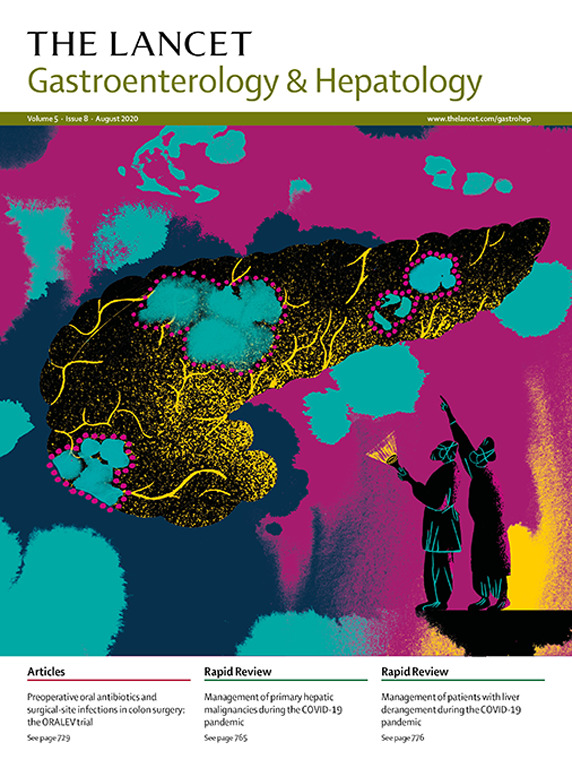Research in Brief
IF 30.9
1区 医学
Q1 GASTROENTEROLOGY & HEPATOLOGY
引用次数: 0
Abstract
Section snippets
TACE and immunotherapies for hepatocellular carcinoma
Two phase 3 trials—EMERALD-1 and LEAP-012—highlight promising advances in the treatment of unresectable hepatocellular carcinoma with transarterial chemoembolisation (TACE) combined with immunotherapeutic agents.In EMERALD-1, Bruno Sangro and colleagues randomly assigned patients with unresectable hepatocellular carcinoma amenable to embolisation to receive TACE (current standard of care) plus either durvalumab plus bevacizumab (n=204), durvalumab plus placebo (n=207), or placebo alone (n=205).Thermal ablation for small colorectal liver metastases
Thermal ablation is as efficacious as surgical resection for treating small colorectal liver metastases, but with fewer complications, according to the COLLISION phase 3 trial.Susan van der Lei and colleagues randomly assigned patients with ten or fewer small-size (≤3 cm) colorectal liver metastases to receive either thermal ablation (n=148) or surgical resection (n=148). The study was stopped early at a preplanned interim analysis, after a median follow-up of 28·9 months, based on aPerioperative chemotherapy for oesophageal cancer
Perioperative chemotherapy improves survival in patients with resectable oesophageal adenocarcinoma, according to the ESOPEC phase 3 trial.Jens Hoeppner and colleagues randomly assigned patients to receive either perioperative chemotherapy with FLOT (fluorouracil, leucovorin, oxaliplatin, and docetaxel) plus surgery (n=221) or preoperative chemoradiotherapy (radiotherapy at 41·4 Gy and carboplatin and paclitaxel) plus surgery (n=217). At median follow-up of 55 months, 3-year overall survivalPlozasiran for persistent chylomicronaemia
The siRNA plozasiran significantly lowers triglyceride levels and reduces the risk of pancreatitis in patients with persistent chylomicronaemia, suggests the PALISADE phase 3 trial.Gerald F Watts and colleagues randomly assigned patients to receive plozasiran at 25 mg (n=26) or 50 mg (n=24), or placebo (n=25), subcutaneously every 3 months for 12 months. At 10 months, the median percentage change from baseline in fasting triglyceride level was −80% in the plozasiran 25 mg group, −78% in the求助全文
约1分钟内获得全文
求助全文
来源期刊

Lancet Gastroenterology & Hepatology
Medicine-Hepatology
CiteScore
50.30
自引率
1.10%
发文量
0
期刊介绍:
The Lancet Gastroenterology & Hepatology is an authoritative forum for key opinion leaders across medicine, government, and health systems to influence clinical practice, explore global policy, and inform constructive, positive change worldwide.
The Lancet Gastroenterology & Hepatology publishes papers that reflect the rich variety of ongoing clinical research in these fields, especially in the areas of inflammatory bowel diseases, NAFLD and NASH, functional gastrointestinal disorders, digestive cancers, and viral hepatitis.
 求助内容:
求助内容: 应助结果提醒方式:
应助结果提醒方式:


